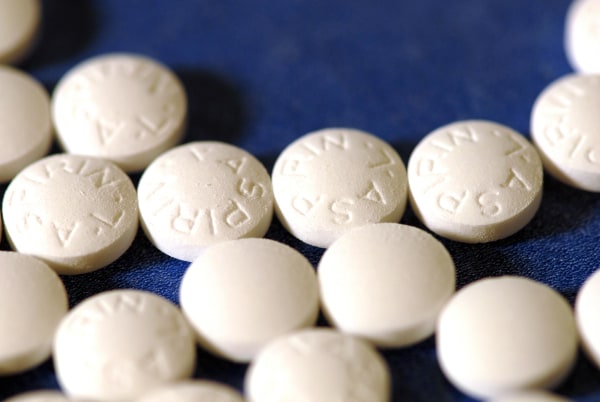APR 12 2016,
Many adults who have never had a heart attack or stroke should take aspirin every day to keep it that way, new U.S. guidelines say.
People in their 50s with risk factors for cardiovascular disease - including high blood pressure, high cholesterol or a history of smoking - may benefit from starting a daily aspirin for at least a decade, according to the U.S. Preventive Services Task Force (USPSTF), a government-backed panel of independent physicians.

A daily low-dose aspirin may also help protect against colon cancer in people who are taking it to prevent heart attacks and strokes.
Because aspirin can cause bleeding in the stomach and brain, this advice doesn't apply to people with bleeding disorders.
"As with any drug, patients and their doctors must balance the benefits and risks of aspirin," said USPSTF chair Dr. Kirsten Bibbins-Domingo of the University of California, San Francisco.
Adults aged 50 to 59 who have at least a 10 percent risk of having a heart attack or stroke in the next decade can benefit the most from taking 81 milligrams of aspirin a day, according to the new guidelines.
The American College of Cardiology provides an online risk calculator here:bit.ly/1UEFYtE.
The advice doesn't apply to people in their 60s because the bleeding risk increases with age, however, and the jury is still out on whether this approach makes sense for people under 50 or over 70, the Task Force concluded.
"Some people may benefit from aspirin more than others, which is why there are several recommendations based on age," Bibbins-Domino added by email. The Task Force encourages people to talk with their doctor about whether taking aspirin is appropriate, she said.
Nearly 40 percent of U.S. adults over 50 already take aspirin to prevent a first heart attack or avoid a second one, according a research review published with the new guidelines in Annals of Internal Medicine.
But the Task Force is at odds with the U.S. Food and Drug Administration, which has denied efforts by Bayer HealthCare LLC to market aspirin for preventing heart attacks and strokes in people with no history of cardiovascular disease.
"All that aspirin does if your heart attack risk is really low is cause you harm," said Dr. Steven Nissen, who served on an FDA advisory panel that recommended against widespread use of aspirin for primary prevention and chairs the department of cardiovascular medicine at the Cleveland Clinic in Ohio.
At least one in 10 people taking aspirin don't need it, recent research suggests.
Patients can buy aspirin without a prescription, and doctors are also free to put people on medicines for purposes that aren't approved by the FDA.
The FDA did not immediately respond to a request for comment.
Aspirin helps prevent blood cells called platelets from sticking together and clogging arteries, leading to heart attacks and strokes. The drug carries a bleeding risk because the body also relies on platelet clusters to seal wounds by forming scabs.
Additionally, aspirin might lower the risk of colorectal cancer by acting on a biochemical pathway these tumors need to grow, said Dr. David Weinberg, chair of the department of medicine at Fox Chase Cancer Center in Philadelphia.
But patients shouldn't take aspirin for cancer prevention, Weinberg, who isn't on the Task Force, said by email. Instead, they should think of the reduced cancer risk as an added benefit if they already need aspirin to address the risk of heart attacks and strokes.
"For those persons already at higher risk for cardiovascular disease, on balance aspirin is a good idea to reduce cardiovascular disease risk alone," Weinberg said. "However, it appears it will also reduce colorectal cancer risk at the same time, which represents a benefit with little or no additional risk if aspirin is already indicated."

